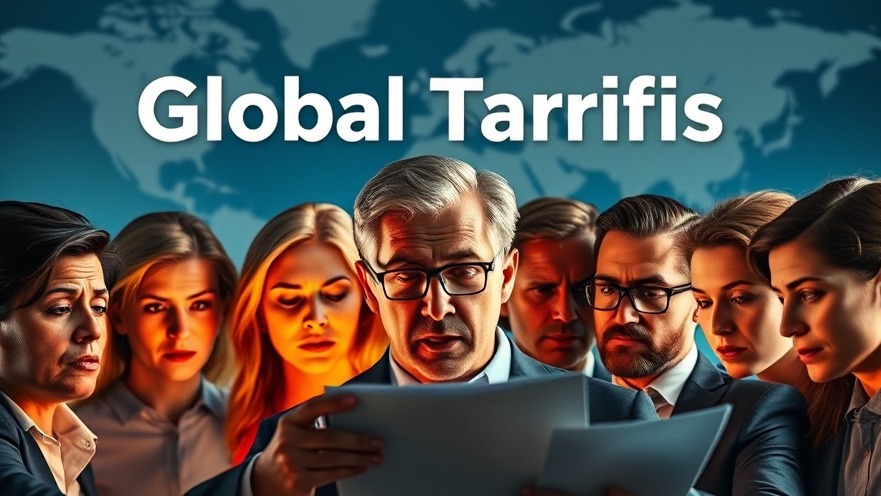
Understanding Trump's Global Tariffs: Key Insights
The ongoing trade policies of U.S. President Donald Trump, specifically regarding tariffs, continue to evoke concern and debate among global leaders and economists. Recent discussions between Canadian officials and U.S. trade representatives have yielded new insights into this complex regulatory environment. Tariffs, once considered a temporary tool, have morphed into a long-term strategy influencing international trade.
What Drives the Tariff Narrative?
During a crucial meeting in Washington, Ontario Premier Doug Ford and representatives from Canada's federal government engaged in a comprehensive dialogue with U.S. Secretary of Commerce Howard Lutnick and Trade Representative Jamieson Greer. This meeting was said to provide clarity about Trump's intent regarding tariffs, which now appear to be an integral part of the United States' economic framework rather than mere negotiating tactics.
David Paterson, Ontario's representative in Washington, indicated that tariffs are reshaping global trading patterns. This statement reflects a broader acknowledgment of how increasing tariffs are strategically aimed at balancing the U.S. federal budget amid rising deficits, which reached $1.83 trillion in fiscal year 2024, according to U.S. Treasury data.
The Impact of Deficit on Trade Policy
The discussions highlighted three key measures the U.S. government is pursuing to tackle its budget concerns. The first aim is through a significant budget resolution featuring tax cuts while ensuring deficits do not spiral further. The second involves finding efficient means to implement these tax cuts without exacerbating the deficit. Finally, the overarching goal remains a shift toward more reciprocal trade agreements that reflect U.S. economic interests and promote domestic job creation.
Evaluating the Global Reaction
With Trump imposing tariffs on several nations, including crucial allies like Canada, economists worry about the potential ripple effects on markets and relationships. There is a sentiment among critics that Trump's tariff threats are leading not just to economic strain but also to diplomatic friction.
This sentiment was echoed in a piece from The New York Times, which reported that American officials asserted there would be no exceptions for Canada regarding these new tariffs, indicating a hardline stance that could unsettle bilateral relations and spark retaliatory measures.
A Chilling Influence on Markets
Financial markets have already shown signs of volatility in response to Trump's tariff announcements. For instance, after vocally threatening to quadruple tariffs on steel and aluminum, stock markets experienced sharp declines only to bounce back somewhat when hints of a reversal were indicated. Such fluctuations illustrate the precarious nature of current economic atmospheres heavily influenced by tariff discussions.
The Broader Outlook of Trade War Dynamics
In a climate filled with uncertainty, the potential for a global trade war looms large. Observers note the interconnectedness of various economies and that retaliatory tariffs could exacerbate already strained trade relationships. Such dynamics call for a reevaluation of current trade practices and a shift toward more sustainable economic agreements.
Steps Ahead for Canadian Officials
As Canadian leaders return from their Washington meetings, they recognize the need to strategize effectively in light of the U.S. tariff policies. Discussions must pivot towards finding a robust response framework that could engage U.S. officials while mitigating the adverse impacts on Canadian industries. The trade landscape appears to be shifting, and Canadian officials must act wisely to navigate these changes.
What This All Means for the Average Citizen
The ramifications of these tariffs will extend beyond corporate discussions and political rhetoric, directly impacting consumers. From increased prices on imported goods to a potential unravelling of complex supply chains, average citizens may soon feel the consequences of global trade policies shaping their purchasing power.
Call to Action: Staying Informed Amid Change
As we observe the evolving trade landscape under Trump's administration, it is imperative for businesses and individuals alike to stay informed of these changes. Engaging in discussions about the potential impacts on your economic interests can empower you to adapt and thrive in these shifting times.
 Add Row
Add Row  Add
Add 



 Add Row
Add Row  Add
Add 
Write A Comment